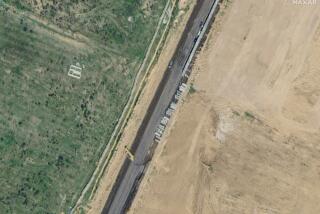Signs of Danger Preceded Bombing
- Share via
NASIRIYAH, Iraq — In the past two weeks, Western and Iraqi officials saw signs that plans might be underway for a violent attack here but did not have enough information to prevent the suicide bombing Wednesday that killed more than 30 people, including at least 18 Italians.
It was 10 days ago that Nasiriyah police captured a high-ranking official of Saddam Hussein’s ousted regime along with several former members of his Mukhabarat intelligence service, according to officials with the U.S.-led Coalition Provisional Authority and Iraqi police. The police also received written warnings of imminent attacks on schools.
The capture of the former regime aides and the warnings of violence were previously unheard-of events in the Shiite Muslim-dominated region.
The capture of Khalid Hasim Habib -- who served as chief aide to Ali Hassan Majid, the notorious cousin of Hussein who earned the nickname “Chemical Ali” for his gassing of thousands of ethnic Kurds -- in a Nasiriyah house suggested that the city, known for friendly relations with foreign troops, could be a target.
“My view was he wasn’t here for a holiday,” said John Bourne, the Coalition Provisional Authority’s governance coordinator for Dhi Qar province.
Habib was transferred to Umm al Qasr in southern Iraq, where he is being interrogated by coalition authorities.
Since his arrest, coalition forces have been on higher alert. But the nature of the insurgency made it difficult to determine the likely target, said Adrian Weale, a member of the British military working at the coalition office in Nasiriyah.
The attackers could maintain a low profile while gathering information. And because the city is a major transit point for trucks hauling cargo into and out of Iraq, a truck such as the one carrying the bomb, which weighed at least 500 pounds, would attract little attention.
“Reconnaissance on this sort of attack can be done fairly easily, and the actual weapon can be brought in from a long ways away,” Weale said.
Outside Help Suspected
Nasiriyah police believe that assistance was provided by foreign fighters or possibly Iraqis who adhere to the strict Wahhabi form of Islam and may have acted as the drivers and technical experts.
The former Mukhabarat agents “need help. The foreigners are supplying maybe advice, maybe finances,” said Lt. Col. Mohammed Nima, the deputy police chief of Nasiriyah.
Police had already discovered that former regime members had tried to enter the province since the height of the war, but they were never caught. Starting about three months after the end of major combat on May 1, Iraqi police began receiving tips about high-ranking members of Hussein’s Baath Party traveling to the area. On at least two occasions, police tried to stop them.
This week, there were reports that a leading former regime member had passed through Nasiriyah on his way to Basra.
Officials believe Nasiriyah was targeted because it had garnered a nationwide reputation for tranquillity and safety for coalition troops.
In contrast to almost every other region in Iraq, not a single bullet had been fired at coalition forces since the end of major combat.
Nor were there any attacks using homemade bombs or rocket-propelled grenades -- both of which have occurred with increasing frequency elsewhere in the country.
“Nasiriyah is known as the most secure and stable place in Iraq from the point of view of civilians being targeted, so if you were trying to destabilize the country, the place where it would really have an impact is here,” Bourne said.
The city was the scene of some of the most violent resistance to Hussein and brutal reprisals by the regime after the Persian Gulf War in 1991. Wednesday’s bombing may have been designed by Hussein loyalists to send the message that residents were still not safe.
“They want to give the people the impression that the multinational troops are useless, weak and cannot do anything,” said Kadhum Jabir Sadrhan, an engineer and secretary of the Provincial Council.
Nasiriyah is the city where a 1996 assassination attempt on Hussein’s son Uday was planned. After the Gulf War, residents stood up to the Iraqi army, holding it at bay at a key bridge over the Euphrates River until air power was called in.
In reprisal, Hussein built a dam that dried up the region’s marshes, depriving many residents of their livelihoods. He also starved the province of electricity -- although it had an efficient plant by Iraqi standards -- allowing it to run just three to four hours a day. He bombed villages, and his Baathist machine and local intelligence officers imprisoned, tortured or harassed many local leaders.
Wednesday’s bombing had an immediate effect throughout the nation. The coalition is reassessing security for many of its facilities.
“What happened yesterday has caused an Iraq-wide consideration of the vulnerabilities of provincial towns,” Bourne said.
A Wall Is Going Up
Within hours, Italian troops were erecting sand-filled barriers across roads leading to their compounds and further limiting access to the coalition building, where a tall cement wall was already under construction. Patrols were being increased, and a spokesman for the Italian brigade in Nasiriyah said all security practices were being reviewed further.
Throughout the city, Italian soldiers appeared to be especially on their guard, in some cases preventing reporters from approaching closer than 50 feet. Police and local militias also stepped up patrols and sweeps through the city.
There are also plans to ask the coalition to relocate its headquarters and troops outside the city limits to minimize casualties in any future incidents, Sadrhan said.
“It will be safer for us and more peaceful for them if they are farther from residential areas,” he said.
More to Read
Sign up for Essential California
The most important California stories and recommendations in your inbox every morning.
You may occasionally receive promotional content from the Los Angeles Times.













